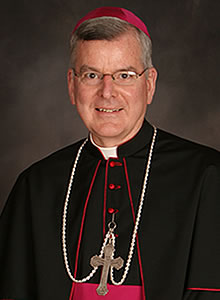
I am writing this column after two weeks of vacation. It has been a quiet time of praying, reading, meditating, visiting friends, exercising, watching videos and sleeping. I knew it had been a successful vacation when my chiropractor told me he had not seen my back so regularly aliened in a long time! Ah, to be freed from the stress of life’s challenges!
From this perspective, I hope that you, too, are able to get some “down” time this summer before the rush of activities begins again at the end of August.
Above all, we need time to “rest in the Lord” . . . to rise above the forest and take in the symmetry of the trees. To ponder questions about our destiny, our vocation, our relationships with our neighbor, especially those who join us in making up the Body of Christ.
Encountering the Word
For my own part, my thoughts have been turning of late to what it means to be “Church.” These are reflections not merely of a theoretical or theological perspective, but more on an existential level, i.e., what is my experience of Church? How do I see my role as a member of the Church?
It is, after all, in the assembly of the “Church” that I encounter the living, dynamic Word of God.
That Word is more than an audible expression of thought. It is rather a Person who, in fact, reveals the face of God to me. Do I see that? Do I experience it? If not, what can I do differently to make my contact with the Word a real encounter with that Person?
Perhaps I need to make the Scriptures a greater part of my daily prayer. Perhaps I should read over the Scriptures before going to Sunday Mass. In any event, I must ask myself how this living Word, inspired and sustained by the Holy Spirit, can make more of a difference in my life.
This leads me to consider and reaffirm how the dogmas of the Creed are not some formulas that are extrinsic to, or in addition to, the Scriptures. Rather, they are the common threads of truth that weave their way throughout the scriptural texts.
These threads remind us with great forcefulness that life is not a “self-project,” a drama of self-definition which is the result of our own ingenuity and effort.
Rather, our life was created by a loving God, who has offered us redemption and release from our own self centeredness in order to live one day in the company of the saints. We are made for love, and divine love at that.
And this is where the teaching vocation of the Church, that organ of the Body of Christ which we call the Magisterium, comes in to play. This is the “living voice” of the faith assembly that preserves the fundamental message of Scripture and Tradition, that is to say, love, properly understood and properly lived.
The Magisterium serves as a sure guide offering expression and understanding to the formulation of the truths we profess, preserving them from error and transmitting them, whole and entire, to the next generation of believers.
Importance of teaching office
Unfortunately, because of a pervasive skepticism about authority in general, many believers today question any statement issued by the Magisterium.
This is indeed a problem that threatens the lived reality of the faith and demands on the part of the believer not just a greater openness to the messenger, but a concerted effort to research questions that arise and the Magisterium’s answers to them in light of the Scriptures and Tradition.
The Catechism of the Catholic Church reaffirms the importance of this teaching office of the Church when it states in paragraph 85:
“‘The task of giving an authentic interpretation of the Word of God, whether in its written form or in the form of Tradition, has been entrusted to the living teaching office of the Church alone. Its authority in this matter is exercised in the name of Jesus Christ.’ This means that the task of interpretation has been entrusted to the bishops in communion with the successor of Peter, the Bishop of Rome.”
My friends, such are the thoughts that come to me after a few weeks of rest and recreation.
What you and I are about as “Church” is serious business. Indeed, the salvation of souls weighs in the balance.
The effectiveness of our witness to the faith is being strongly challenged these days. But to defend what we believe, we must first know what it is that we do believe.
The Magisterium is a great gift that helps provide an answer to such an important question.
God bless you!



